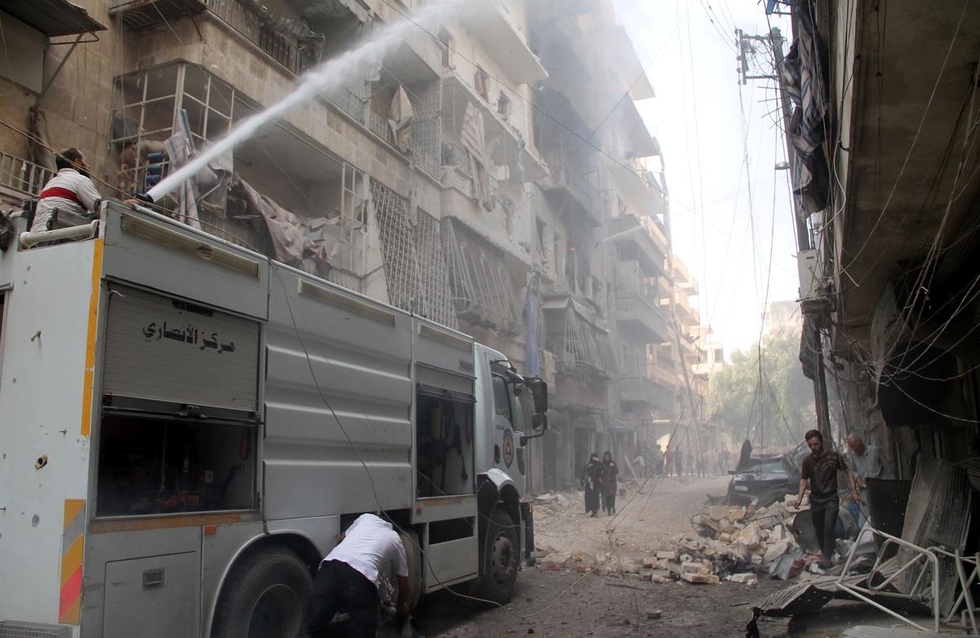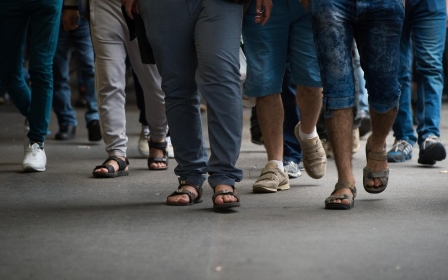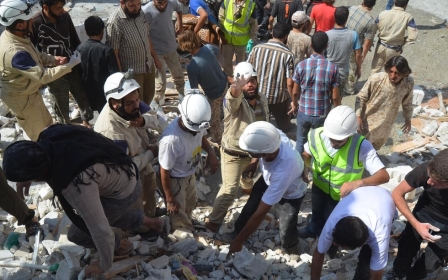Gulf states lead call for regime change in Syria

The Organisation for Islamic Cooperation (OIC), the world’s second largest intergovernmental body after the United Nations, issued a dramatic call this Sunday for the overthrow of the regime of President Bashar al-Assad in Syria.
The new OIC communique comes in the wake of recent indications that the West is willing to slow down the offensive against Assad to focus on defeating the Islamic State (IS).
Earlier this month, Downing Street declared plans for “limited” airstrikes against IS targets in Syria, coupled with a diplomatic push that would see Assad remain in power for six months.
Toward a ‘new Syrian state’
Highlighting the need for urgent action to address Syria’s escalating refugee crisis, the OIC communique on behalf of 57 member states urged the UN Security Council (UNSC) to renew “the pursuit of rapid political solutions” to the conflict that would establish a “transitional government with full executive power that would allow building a new Syrian state”.
This would require the UNSC to “fully implement the Geneva Communique,” the aborted 2012 roadmap for the transition of Syria to a new unity government without Assad.
Among the major reasons the Geneva plan broke down was US and UK determination to continue arming and training rebel groups even during the peace talks, the exclusion of Kurdish groups from the process, and the West’s insistence at the time that the outcome would necessarily exclude Assad from power.
The new OIC communique is thus effectively a call to escalate military support for Syrian rebels to forcibly oust Assad from power.
Noting that the “root cause” of the refugee crisis is “war crimes committed by the regime in Syria,” the OIC demands that the Security Council create “a multi-dimensional UN peace-keeping operation in Syria as a prelude to restoring security and stability in the country”.
The communique also condemns “other extremist groups, especially Daesh, which continue to unleash brutality against helpless people leading to the murder of thousands of innocent civilians”.
While urging “all countries to refrain from extending military support to the Assad regime that is responsible for crimes against humanity and the current humanitarian crisis,” the OIC statement failed to call for the cessation of military support to Syrian rebels.
The OIC has traditionally been dominated by the Gulf kingdoms, especially Saudi Arabia, where its headquarters are. In recent years, other Muslim-majority powers like Turkey, Iran and Malaysia have challenged Saudi domination of the OIC.
In response, the Saudis have attempted to reassert control over the intergovernmental body as a means to legitimise itself across the Muslim world, a move represented by the selection of former Saudi government minister Iyad Madani to the post of secretary-general.
I asked Ambassador Yahya Lawal, director of political affairs at the OIC, whether the OIC’s communique amounted to a call for “regime change”. He neither confirmed nor denied this reading, but said: “The Assad regime is responsible for creating the environment leading to the humanitarian catastrophe. There is no possibility of resolving the crisis with Assad in power. Ultimately Assad and the institutions of his rule have to go.”
War crimes
The latest figures from one monitoring group, Violations Documentation Centre, indicate that a total of 85,404 civilians have been killed in Syria’s civil war by both regime and rebel forces, out of around 200,000 overall, most of which are combatants.
Assad has slaughtered some 18,886 civilians in air attacks with warplanes and helicopters. A quarter of these deaths are children. Rebel groups have killed at least 8,871 civilians, often after kidnapping and torturing them.
A further 28,277 civilians have been killed in mass shootings and gunfire between government and rebel forces, and another 27,006 killed by mortar, artillery and rocket attacks by both sides.
As pointed out by Micah Zenko, a fellow at the Council of Foreign Relations’ Centre for Preventive Action, the figures show that “22 percent” of the total civilian death toll can be definitively attributed to “Syrian government air attacks,” while most other civilian deaths are occurring due to government infantry and artillery attacks, and rebel counterfire.
“Those who propose a no-fly zone or “cratering” Syrian Air Force runways should recognise that these tactical responses will do nothing to save the lives of most Syrian civilians,” observed Zenko.
Estimates vary due to different methodologies and lack of verification, but another group, the Syrian Observatory for Human Rights (SOHR), has similar estimates. They report that approximately 50,000 regime forces, 37,000 rebels, and 34,000 foreign fighters have been killed to date.
Critics of these estimates point out that their verification methods are unclear, difficult to confirm, and often based on questionable sources. Most agree, however, that all estimates are likely to be very conservative due to the limited number of observers and dangerous conditions on the ground.
The figures show, contrary to the OIC communique, that both government and rebel forces are systematically committing war crimes and targeting civilians, while the greater success of the Assad regime in inflicting violence is due to its more robust military capabilities compared to rebel forces.
Extremists
Leading OIC member states like Saudi Arabia, Qatar, the UAE, Kuwait and Turkey, who are currently part of the US-led coalition fighting the Islamic State (IS), have played a key role in providing money and arms to various rebel groups.
Intelligence sources and official documents confirm that most of this Gulf state support went to Islamist extremist groups, including al-Qaeda.
Ambassador Lawal denied that OIC member states were financing extremist groups in Syria.
“There is no proof,” he said. “These are just accusations. All the evidence shows that the primary cause of the humanitarian crisis and refugee exodus is the Assad regime and its war crimes. Assad’s removal from power in Syria is an essential precondition for resolving the humanitarian crisis.”
Aborting peace
Meanwhile, controversy has developed over new accusations that the West rejected a 2012 proposal from Russia on a political transition that would see Assad exit from power.
The allegations, reported in the Guardian yesterday, were made by former Finnish president Martti Ahtisaari, a Nobel Prize winning peace negotiator, who claimed that Russian envoy Vitaly Churkin had put forward the proposal in secret negotiations.
Ahtisaari, who met with the UN missions of the US, Russia, UK, France and China at the time, said that Churkin had reconfirmed the offer a second time after a trip to Moscow. He complained that despite relaying the message to the US, British and French missions at the UN, they were disinterested.
“Nothing happened,” he said, “because I think all these, and many others, were convinced that Assad would be thrown out of office in a few weeks so there was no need to do anything.”
Today, however, Foreign Policy quotes Western officials denying that Russia had ever made such an offer formally, noting that President Vladimir Putin and other Russian leaders never mentioned such a proposal at talks in Geneva four months after the episode recounted by Ahtisaari.
The Assad plan
The FP article ignores that the offer outlined to Ahtisaari by Churkin was not part of direct talks, but part of official “backchannel negotiations”. Backchannel diplomacy offers conflicting parties an opportunity to explore options that they would be uncomfortable with discussing publicly to seek a resolution.
Ahtisaari contends that the US, Britain and France simply ignored the Russian envoy’s offer and refused to even engage with the Russians on the possibility during these backchannel discussions prior to official talks, which would explain why Russia did not raise them again.
In fact, the 2012 peace talks collapsed mainly because Western governments insisted on preconditions they had initially dropped in Geneva, including non-negotiable demand for Assad to immediately step-down, automatic triggers for sanctions, and the reference to Chapter VII of the UN Charter as pretext for a potential military intervention. Russian opposition to the preconditions created a deadlock in the Security Council.
The controversy coincides with Russia’s recent stepping up of military assistance to Assad.
Some corroboration for Ahtisaari’s claim comes from an insider cited by former Newsweek reporter, Robert Parry, who told him that “Obama agreed to – and may have even encouraged – Putin’s increased support for the Assad regime, realising it’s the only real hope of averting a Sunni-extremist victory.”
Previously, Parry reported that Obama had gone through Russian intelligence to secure a secret arrangement with Assad to coordinate airstrikes on IS with the Syrian military. If true, this would suggest that both the West and Russia quietly agree on the continuation of Assad’s brutal reign, for now.
- Nafeez Ahmed PhD is an investigative journalist, international security scholar and bestselling author who tracks what he calls the 'crisis of civilization.' He is a winner of the Project Censored Award for Outstanding Investigative Journalism for his Guardian reporting on the intersection of global ecological, energy and economic crises with regional geopolitics and conflicts. He has also written for The Independent, Sydney Morning Herald, The Age, The Scotsman, Foreign Policy, The Atlantic, Quartz, Prospect, New Statesman, Le Monde diplomatique, New Internationalist. His work on the root causes and covert operations linked to international terrorism officially contributed to the 9/11 Commission and the 7/7 Coroner’s Inquest.
The views expressed in this article belong to the author and do not necessarily reflect the editorial policy of Middle East Eye.
Photo: Syrians firefighters extinguish a fire after airstrikes on the opposition-controlled Meshad neighbourhood of Aleppo, Syria on September 15 (AA)
Middle East Eye propose une couverture et une analyse indépendantes et incomparables du Moyen-Orient, de l’Afrique du Nord et d’autres régions du monde. Pour en savoir plus sur la reprise de ce contenu et les frais qui s’appliquent, veuillez remplir ce formulaire [en anglais]. Pour en savoir plus sur MEE, cliquez ici [en anglais].





